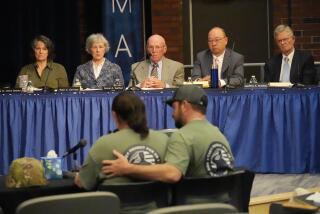HUMAN RIGHTS : S. African Judge Digs for Roots of Violence
- Share via
VEREENIGING, South Africa — Shortly after 10 one night this week, under a full moon and a clear sky, a slightly built judge and a group of lawyers ventured into the township of Boipatong to see what they could see.
The conditions were not chosen by accident. It was on just such a night, two months ago, that more than 40 black men, women and children were murdered in Boipatong.
This week’s nocturnal visit was part of a broad effort by Judge Richard J. Goldstone to determine, once and for all, what happened there on June 17--the night that derailed negotiations between President Frederik W. de Klerk and the African National Congress and sent the country into a political tailspin from which it has yet to recover.
The Goldstone Commission, the most important independent body of its kind in South African history, has investigated a dozen violent incidents in the last 10 months, affixing blame variously on the ANC, its rival, the Inkatha Freedom Party, and government security forces.
But the panel now faces its biggest challenge--to determine who was responsible for the Boipatong killings and what role, if any, De Klerk’s security forces played.
In its first two weeks of hearings, the commission has heard half a dozen witnesses who say they saw security force armored vehicles escorting attackers in the township. The police and army have promised to present witnesses to refute that testimony.
Whatever the outcome, most South Africans, including De Klerk and ANC President Nelson Mandela, have pinned their hopes for the future on Goldstone. And the judge, personally selected by De Klerk from South Africa’s highest appeals court, is expected to be assigned the added task of carrying out a full investigation of the security forces, as recommended by the United Nations.
“Unless the government gets to the bottom of this violence, you can forget about a political settlement here in the next 12 to 18 months,” said David Welsh, a political studies professor at the University of Cape Town.
The Goldstone Commission does not have the power to prosecute or try anyone, but its recommendations carry substantial weight in a nation confused by accusations and counter-accusations stemming from the violence that has claimed nearly 8,000 lives in the last two years. (The toll mounted Friday when an apparent dispute over taxi routes left at least four dead in Tembisa township, near Johannesburg.)
The commission already has won a reputation for independence among anti-apartheid groups by recommending that charges be filed against police in several cases.
The panel’s first and most important task is to determine what role the police and army played in the massacre, which was apparently carried out by about 200 Inkatha supporters from a nearby migrant workers’ hostel.
The ANC contends that security forces in armored vehicles were present during the massacre, aiding the attackers or refusing to intervene. The government, which has charged 77 black residents of the hostel in the attack, denies this.
But evidence that might support the police claim--tapes of security force radio traffic that night--was destroyed by a police technician, apparently inadvertently, the day after the massacre.
Several witnesses also have testified that heavily armed white men in camouflage fatigues were present during the attack and that police summoned to the scene refused to stop the killings.
The most damaging testimony so far came from Ntietsa Xaba, a Boipatong constable who was awakened by gunfire that night and saw four armored vehicles in the township. Two black men in red headbands and armed with machine guns were running in front of the vehicle, shouting “This is our day” in Zulu and firing shots into the air, and two armed white men in camouflage fatigues followed the vehicle, he said.
He also testified that an investigating officer had threatened to “donder” (hit) him if he did not change his statement to delete the reference to the men following the armored vehicle and to indicate that he saw the vehicles long before the massacre began.
Aftermath of a Massacre
One of the most highly charged homicide cases in recent South African history has been turned over to an independent inquiry commission headed by Richard J. Goldstone, a South African Appeals Court judge. Just what is this panel seeking to do?
Who: Goldstone, selected by President Frederik W. de Klerk, is chairman of the panel looking into the Boipatong massacre. To assist him, he has selected Prafullachandra Bhagwati, a retired chief justice of India, and Solomon Sithole, a Pretoria lawyer.
What: The panel, one of several Goldstone commissions that have investigated various incidents of violence over the past 10 months, has a mandate to investigate the June 17 slayings of more than 40 people in Boipatong township. Its first goal is to examine allegations of security force involvement in the massacre.
Where: The panel has been meeting in Vereeniging, South Africa.
When: Two weeks of hearings concluded Friday. The panel resumes Nov. 2.
How: The panel has the authority to summon witnesses, who are questioned by attorneys representing the police, the defense force, the African National Congress and the Inkatha Freedom Party.
Why: The Boipatong massacre prompted the African National Congress to break off talks with the government and demand that De Klerk take steps to end the violence. It also touched off a firestorm here and abroad because of ANC allegations that police may have been involved in the massacre and, even if not, should have been able to prevent it.
Source: Times staff reports
More to Read
Sign up for Essential California
The most important California stories and recommendations in your inbox every morning.
You may occasionally receive promotional content from the Los Angeles Times.













